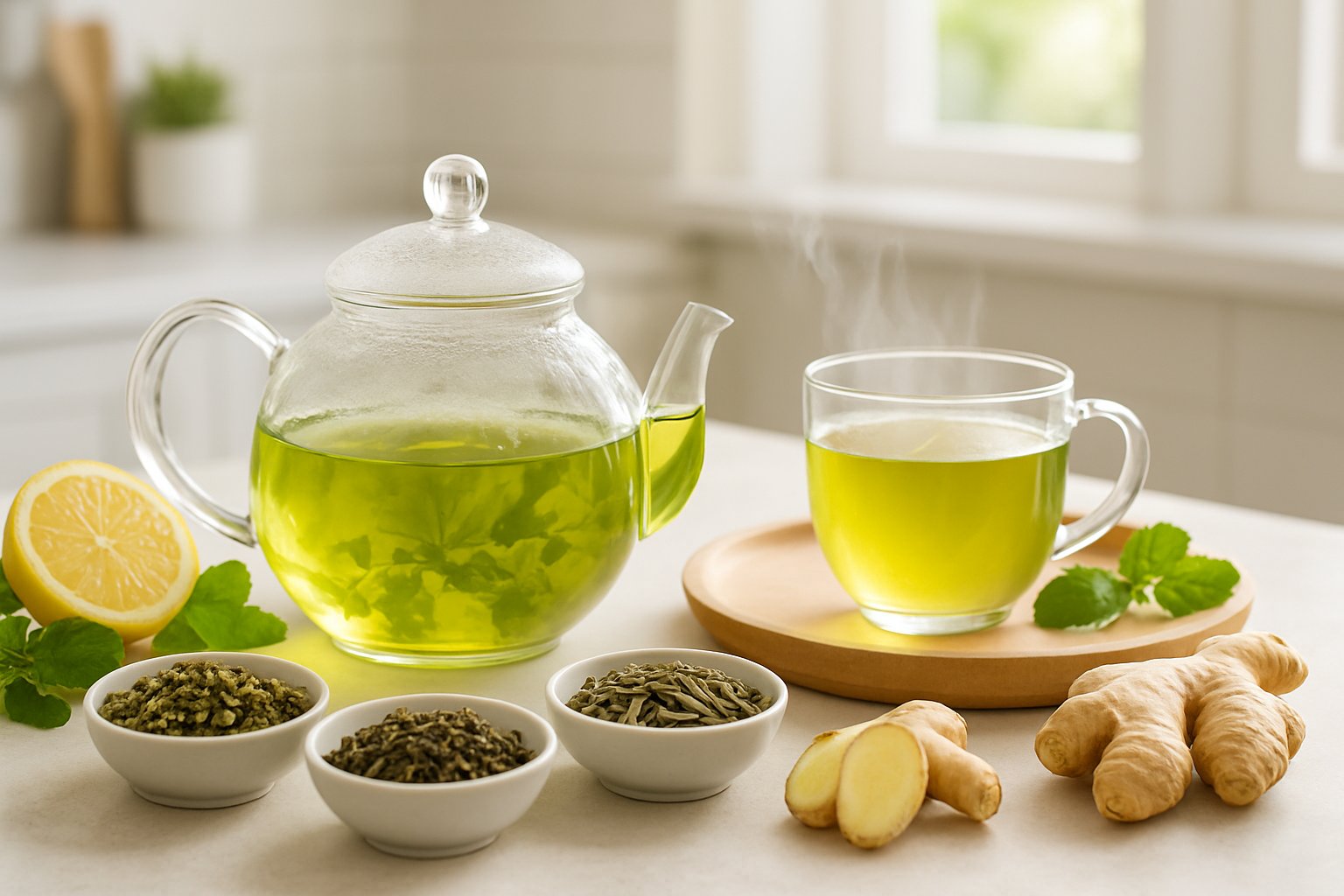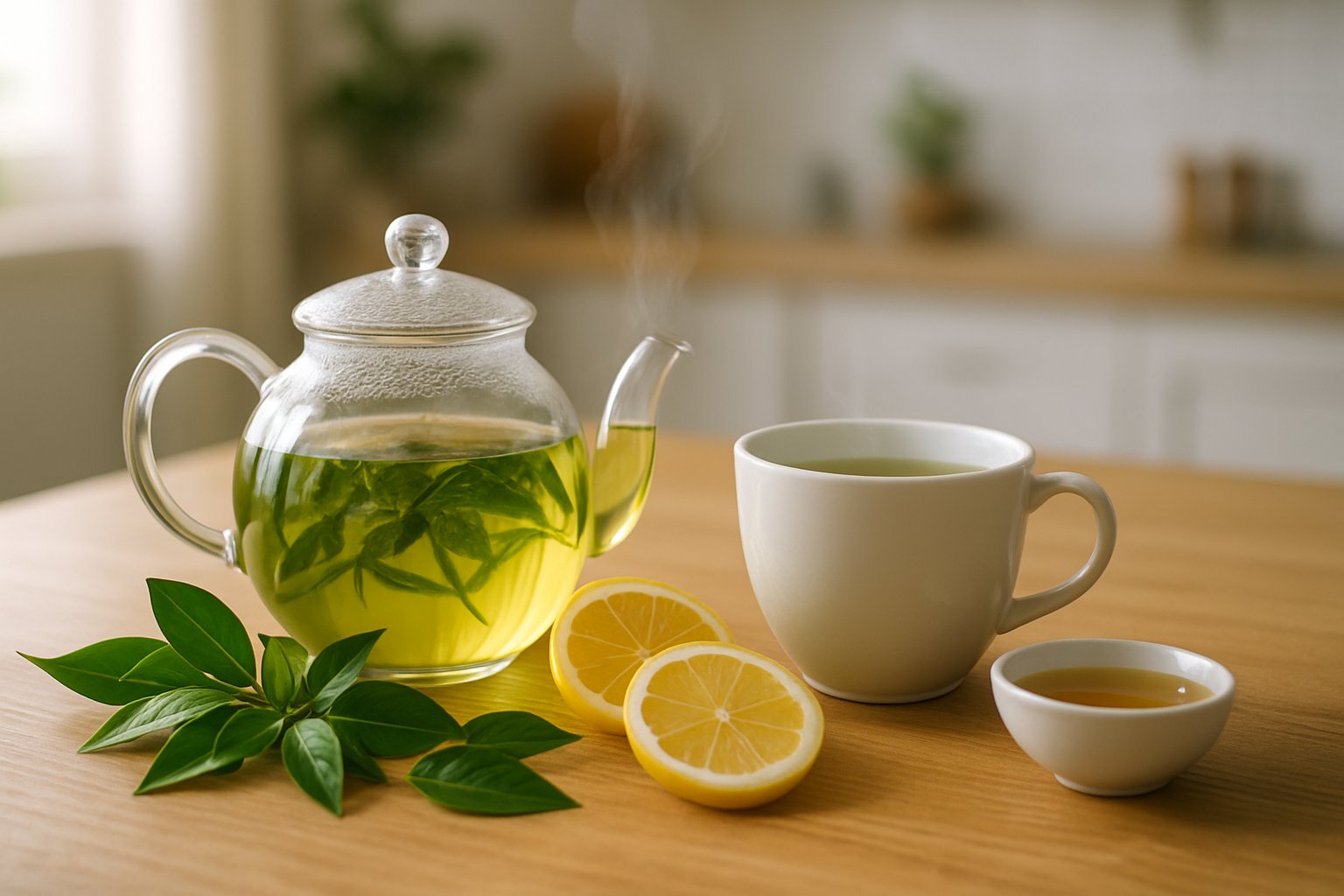Green tea is the most effective tea for weight loss due to its fat-burning catechins and metabolism-boosting caffeine. Other beneficial teas include oolong, black tea, and ginger tea, which offer different weight management benefits. Tea works best as part of a healthy lifestyle that includes proper diet and regular exercise rather than as a standalone weight loss solution.
Many people wonder which tea can best support their weight loss goals. While no single beverage can magically melt away pounds, certain teas contain compounds that may help boost metabolism and support healthy weight management when combined with a balanced diet and exercise.

Green tea stands out as the most researched and effective tea for weight loss, thanks to its high levels of catechins and caffeine that can help increase fat burning and metabolic rate. Studies show that green tea helps oxidize fat[1] and may be particularly effective at reducing belly fat. Other teas like oolong, black tea, and ginger tea also show promising benefits for weight management.
The key lies in understanding which teas offer the most science-backed benefits and how to incorporate them into a healthy lifestyle. Some teas work by boosting metabolism, while others help with digestion or reducing bloating, giving people different options based on their specific needs and preferences.
Key Takeaways
Best Teas for Weight Loss

Several tea varieties from the Camellia sinensis plant contain compounds that support weight management through different mechanisms. Green tea provides catechins and EGCG for fat burning, while oolong tea enhances fat oxidation rates.
Green Tea: Fat Burning and Metabolism
Green tea contains high levels of catechins, particularly EGCG (epigallocatechin gallate), which are powerful antioxidants that help break down fat cells. These compounds work by increasing the body’s metabolic rate and promoting thermogenesis.
Research shows that drinking green tea can boost fat oxidation[1] and help target belly fat specifically. The combination of caffeine and catechins creates a synergistic effect that enhances calorie burn throughout the day.
Matcha, a powdered form of green tea, provides even higher concentrations of these beneficial compounds. Studies indicate that consuming 3-4 cups of green tea daily may contribute to measurable weight reduction.
The EGCG in green tea also helps improve fat metabolism by encouraging the body to use stored fat as energy. This makes green tea particularly effective for supporting long-term weight management goals.
Oolong Tea: Boosting Fat Oxidation
Oolong tea undergoes partial fermentation, creating unique polyphenols that accelerate fat breakdown. This semi-fermented tea contains compounds that specifically target fat oxidation processes in the body.
Studies demonstrate that drinking oolong tea for two weeks can increase fat oxidation rates[1]. The tea works by activating enzymes responsible for breaking down fatty acids for energy production.
Oolong tea also helps regulate blood sugar and insulin levels. This dual action supports weight loss by preventing fat storage while promoting fat burning simultaneously.
The polyphenols in oolong tea are more concentrated than those found in green tea. These compounds help block dietary fat absorption and increase energy expenditure throughout the day.
Black Tea: Flavonoids and Weight Management
Black tea contains theaflavins and other flavonoids that develop during the fermentation process. These antioxidants may be more effective at preventing weight gain than compounds found in other tea varieties.
The fermentation process increases flavonoid levels, which contribute to weight loss by increasing metabolism[1]. Black tea typically contains higher caffeine content than green tea, providing additional metabolic benefits.
Research suggests that drinking three cups of black tea daily can increase antioxidant levels significantly. The polyphenols in black tea help reduce fat absorption and promote fat breakdown.
Black tea’s unique fermentation creates compounds that support healthy gut bacteria. This improved digestive health can contribute to better weight management and reduced inflammation.
White Tea: Antioxidants and Fat Breakdown
White tea contains the highest concentration of antioxidants among all tea varieties from Camellia sinensis. These antioxidants help prevent new fat cells from forming while promoting the breakdown of existing fat stores.
Preliminary studies show that white tea may help prevent obesity[1] by influencing metabolism at the cellular level. The minimal processing preserves maximum antioxidant content.
White tea’s polyphenols work by blocking the formation of new fat cells. This preventative action makes it particularly valuable for long-term weight management strategies.
The tea also helps regulate blood cholesterol levels and reduce inflammation. These additional benefits support overall metabolic health and sustainable weight loss efforts.
Other Effective Teas and Herbal Infusions

Beyond green tea and oolong, several fermented and herbal options offer unique weight loss benefits through improved digestion, blood sugar control, and reduced water retention. These teas work through different mechanisms like supporting gut health and managing stress-related fat storage.
Pu-erh Tea: Fermentation and Gut Health
Pu-erh tea undergoes a special fermentation process that creates beneficial compounds for weight management. This Chinese tea develops probiotic properties during fermentation that support gut health.
The fermentation process breaks down tea compounds into smaller molecules. These molecules are easier for the body to absorb and use for fat metabolism.
Key benefits of pu-erh tea include:
- Enhanced digestion through improved gut bacteria
- Better breakdown of dietary fats
- Reduced cholesterol absorption
Studies show that people who drink pu-erh tea regularly have healthier gut bacteria. Good gut health connects directly to maintaining a healthy weight and proper digestion.
The tea works best when consumed 30 minutes after meals. This timing helps the body process fats more effectively and supports the digestive system.
Rooibos Tea: Stress and Fat Accumulation
Rooibos tea contains no caffeine but offers powerful antioxidants that help manage stress-related weight gain. High stress levels cause the body to store more fat, especially around the waist area.
This South African herbal tea helps lower cortisol levels. Cortisol is the stress hormone that triggers fat storage when levels stay high for long periods.
Rooibos tea benefits:
- Reduces stress without caffeine
- Helps prevent emotional eating
- Supports better sleep quality
The antioxidants in rooibos tea also help reduce inflammation in the body. Less inflammation means better metabolism and easier weight management.
People who drink rooibos tea before bed often report better sleep. Good sleep is essential for maintaining a healthy weight and proper hormone balance.
Hibiscus Tea: Blood Sugar and Water Retention
Hibiscus tea contains anthocyanins that help control blood sugar levels and reduce water retention. These compounds give the tea its deep red color and powerful health benefits.
The tea acts as a natural diuretic without depleting important minerals. This helps reduce bloating and excess water weight that can mask true weight loss progress.
Hibiscus tea effects:
- Lowers blood pressure naturally
- Reduces water retention and bloating
- Helps control blood sugar spikes
Research shows hibiscus tea can lower blood sugar levels after meals. Better blood sugar control prevents the body from storing excess glucose as fat.
The tea also helps replace sugary drinks in a healthy diet. One cup of hibiscus tea has zero calories compared to sodas or fruit juices that can contain 150 calories or more.
Herbal Blends: Ginger, Peppermint, and Cinnamon
Ginger, peppermint, and cinnamon create powerful herbal tea blends that support weight loss through multiple pathways. Each ingredient offers specific benefits for metabolism and digestion.
Ginger increases body temperature and speeds up metabolism. It also helps improve digestion and reduces inflammation throughout the body.
Peppermint tea works as a natural appetite suppressant. The strong scent and flavor can reduce food cravings, especially for sweet foods.
Cinnamon helps with blood sugar regulation by making cells more sensitive to insulin. This prevents blood sugar spikes that lead to fat storage.
| Ingredient | Primary Benefit | Best Timing |
|---|---|---|
| Ginger | Boosts metabolism | Before meals |
| Peppermint | Reduces appetite | Between meals |
| Cinnamon | Controls blood sugar | With meals |
These herbal teas work well for people with diabetes who need better blood sugar control. The natural compounds help the body process glucose more effectively without medication side effects.
Mint tea and other herbal blends also support proper hydration. Staying hydrated helps the body burn fat more efficiently and reduces false hunger signals.
Frequently Asked Questions

Many people have specific questions about timing, types, and methods for drinking tea to support weight loss goals. Understanding the best practices for tea consumption can help maximize potential benefits.
Which teas are effective for weight loss when consumed before bed?
Herbal teas without caffeine work best before bedtime for weight loss support. Rooibos tea offers weight management benefits[1] with its natural sweetness and caffeine-free formula.
Chamomile tea can promote better sleep quality. Good sleep helps regulate hormones that control hunger and metabolism.
Ginger tea consumed before bed may boost overnight metabolism. The warming properties of ginger can continue working while the body rests.
What are the best teas to drink in the morning to aid in weight loss?
Green tea provides an excellent morning boost[1] with its combination of caffeine and fat-burning catechins. The caffeine helps increase energy expenditure throughout the day.
Black tea contains higher caffeine levels than green tea. This makes it effective for morning metabolism enhancement and sustained energy.
Oolong tea offers a middle ground between green and black tea. It provides moderate caffeine with proven fat oxidation benefits.
Can certain teas help reduce bloating and contribute to weight loss?
Peppermint tea effectively reduces bloating[1] by relaxing digestive muscles and improving stomach comfort. The menthol compounds help ease digestive spasms.
Ginger tea supports healthy digestion and reduces stomach discomfort. It helps food move through the digestive system more efficiently.
Fennel tea can reduce water retention and bloating. This creates a temporarily flatter appearance while supporting digestive health.
Are there specific teas that target abdominal fat reduction?
Green tea specifically helps reduce belly fat[1] according to research studies. The catechins in green tea appear to target abdominal fat stores more effectively than other areas.
Studies show that drinking four or more cups of green tea daily can reduce belly fat risk by 44%. This makes green tea the most researched option for abdominal fat reduction.
Oolong tea also shows promise for targeting midsection fat. Research indicates it may help lower insulin levels, which can reduce fat storage around the waist.
What is the recipe for a 21-day fat burning tea?
No single “21-day fat burning tea” recipe exists with proven results. However, people can create effective blends using research-backed ingredients.
A simple daily blend might include green tea as the base with added ginger and lemon. This combination provides catechins, metabolism boosters, and vitamin C.
Another option combines oolong tea with fresh mint leaves and a small amount of cinnamon. This blend offers fat oxidation benefits with digestive support.
Consistency matters more than specific recipes. Drinking 3-4 cups of any proven weight loss tea daily for 21 days may show better results than complex mixtures.
How can one maximize weight loss benefits through proper tea drinking habits?
Timing tea consumption around meals can enhance benefits. Drinking tea 30 minutes before meals may help reduce appetite and improve digestion.
Consuming 3-4 cups of green tea daily[1] appears optimal based on research studies. This amount provides enough active compounds without excessive caffeine.
Avoiding added sugars, honey, or high-calorie creamers preserves the low-calorie nature of tea. These additions can counteract weight loss benefits.
Drinking tea consistently over time produces better results than occasional consumption. Daily tea drinking habits work better than sporadic use for weight management goals.
References
- Studies show that green tea helps oxidize fat. https://www.verywellhealth.com/tea-for-weight-loss-11718497 Accessed October 22, 2025
